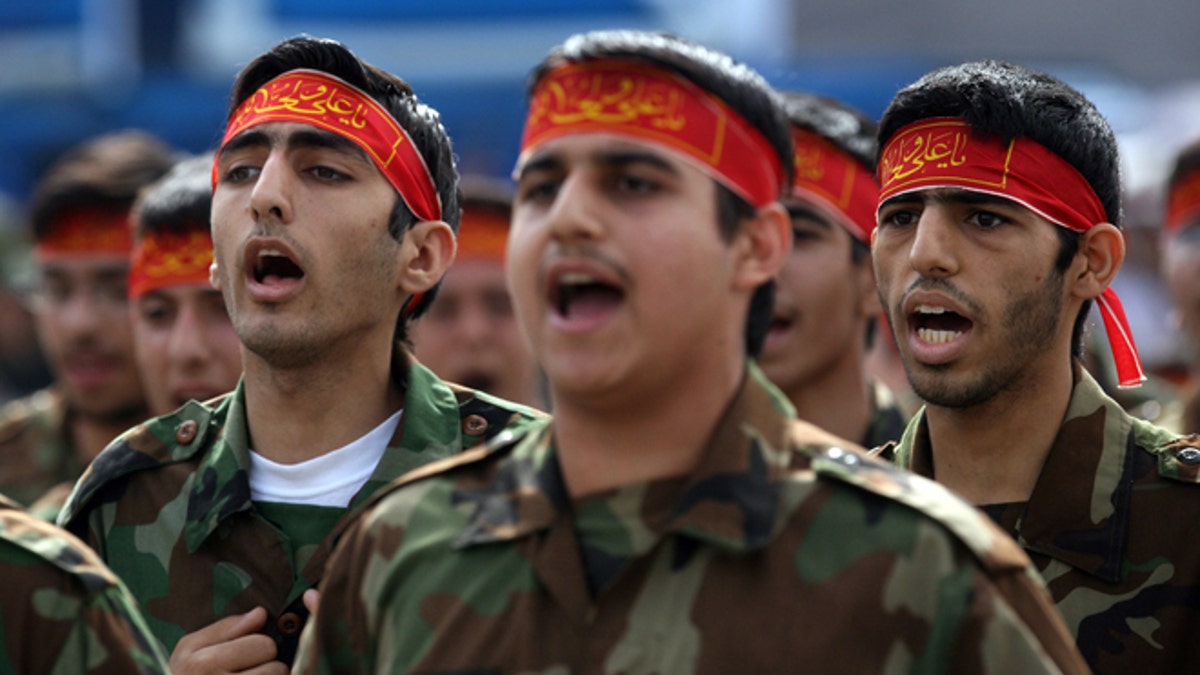
Iranian soldiers march past Iranian President Mahmoud Ahmadinejad during the annual army day military parade on April 17, 2008 in Tehran, Iran. (2008 Getty Images)
Iran is not actively supporting terrorist groups in Latin America, the U.S. State Department acknowledged in a recent report – even though for years it has insisted the influence was growing.
The report, which said that the Islamic Republic’s influence in the region is still a “concern,” said that due to strong sanctions imposed on the country by both the United States and the European Union, Iran has been unable to expand its economic and political ties in Latin America.
“As a result of diplomatic outreach, strengthening of allies’ capacity, international nonproliferation efforts, a strong sanctions policy, and Iran’s poor management of its foreign relations, Iranian influence in Latin America and the Caribbean is waning,” the report stated, according to Bloomberg News.
While the State Department declined to comment on the report because it had not yet been sent to Congress, some Republican lawmakers said that it was too lax on Iran and downplayed the Middle Eastern nation’s threat in the U.S.’s perceived backyard.
“I believe the Administration has failed to consider the seriousness of Iran’s presence here at home,” said Congressman Jeff Duncan, a Republican from South Carolina who wrote the legislation requiring the State Department report, told Bloomberg. “I question the methodology that was used in developing this report.”
Under the presidency of Mahmoud Ahmadinejad, Iran had forged strong relationships with the left-leaning governments of Bolivian President Evo Morales and the late Venezuelan leader Hugo Chávez.
Current Venezuelan President Nicolas Maduro announced in late May that three surveillance drones built with Iran’s help were launched by the Venezuelan government as part of an initiative to curb drug trafficking.
The U.S. government and analysts throughout the region will be keeping a close eye on Iranian-Latin American relations in the coming in the wake of Iran’s presidential election two weeks ago.
Hassan Rohani, the only moderate-reformist candidate in Iran's presidential election, secured a surprising first-round victory after garnering more than 50 percent of the ballots.
Rohani, who was backed by two reformist ex-presidents, Mohammad Khatami and Akbar Hashemi Rafsanjani, defeated four ultra-conservative candidates and a technocrat who finished in last place
The victory by Rohani, who will succeed two-term incumbent Mahmoud Ahmadinejad, could usher in significant changes in Iran's foreign and economic policy and lead to expanded rights for women in the Islamic nation, although there are many restrictions on presidential power and foreign and nuclear policy is determined by Supreme Leader Ali Khamenei.
Rohani, a pragmatic cleric who was secretary of Iran's Supreme Council on National Security and a nuclear negotiator, became the clear choice for reformists after former Vice President Mohammad Reza Aref dropped out of the presidential race.
Follow us on twitter.com/foxnewslatino
Like us at facebook.com/foxnewslatino
